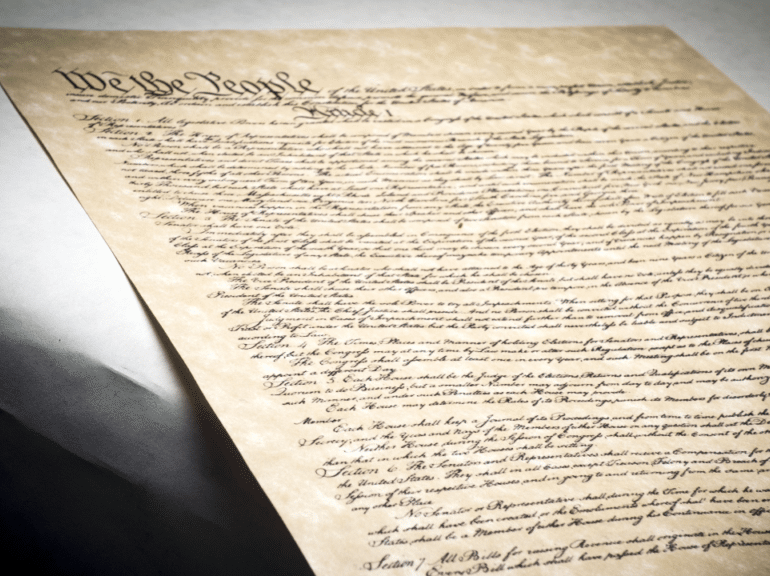
The ideas that formed the Constitution
By: Rob Natelson
Who created the ideas behind the U.S. Constitution?
The history books relate how the Constitution was composed by its 55 “framers” from May 25 to Sept. 17, 1787.
But there’s far more to the story than that.
On Sept. 28, 1787, the Confederation Congress asked the state legislatures to provide for the election of delegates to popular conventions to ratify or reject the Constitution. This sparked the greatest political debate in American history. People from all walks of life—from the wealthiest merchants in the cities, to craftsmen in the towns, farmers in the country, and even slaves in the kitchens—discussed every aspect of the document.
Every state legislature eventually authorized its constituents to elect delegates to a state ratifying convention. Although the states had property qualifications for voting, those qualifications generally were easy to meet, and for this election some states waived them entirely.
Nor was the process limited to white males. Women participated by campaigning—and in New Jersey (and perhaps sporadically elsewhere) by casting ballots themselves. (New Jersey resident Annis Stockton, the wife and mother-in-law of signers of the Declaration of Independence, asserted that in America “women have their equal right of everything.”)
In five states, free African-Americans also voted on the Constitution.
On Dec. 7, 1787, the Delaware convention ratified unanimously. Delaware’s ratification was followed by all the other states, including the new 14th state of Vermont (Jan. 10, 1791).
Schoolbook focus on the framers sometimes leads us to forget that although the Constitution had only 55 drafters, the convention delegates that adopted it as “the supreme Law of the Land” numbered 1,757 (counting the 109 in Vermont). Many thousands of citizens voted for those delegates. It was the greatest exercise in popular democracy theretofore recorded.
Over the ensuing years, the Founders’ Constitution, as occasionally amended, served as the political structure for a nation that became the most successful the world has ever seen. Even today, when some of the Constitution’s provisions have eroded, most of the document continues in full force.
Where Did the Founders Get Their Ideas?
What were the formative ideas behind this brilliant success? Where did they come from? How did the founding generation incorporate them into the Constitution?
Over the next several weeks, we shall answer those questions in a series of essays. The series will examine the lives and ideas of the writers who influenced the founding generation and inspired a new adventure in self-government.
The Founders’ confidence was built partly on faith in a benevolent God. The myth that most of the Founders were Deists or pure secularists is just that—a myth. The overwhelming majority of the founding generation was Christian; the small remainder was mostly Jewish. They were, accordingly, influenced heavily by the Bible. So heavily, in fact, that biblical influences were greater than any short series of essays can address.
These essays, therefore, will focus on the writers who taught the Founders their political lessons—their lessons in republicanism, in political organization, and in political virtue.
Organization of the Series
Each essay will thumbnail the lives and contributions of one or two historical personalities. It will explain how the Founders integrated those personalities’ ideas into the constitutional order.
We shall proceed chronologically, according to the time during which each historical figure lived.
In addition to religious instruction, the Founders’ education centered on the pre-Christian classics of ancient Greece and Rome. Long after leaving school, leading Founders re-read those classics again and again. Many of the thinkers examined in this series were prominent authors from the Greco-Roman tradition.
We shall begin with the Greek philosopher Plato, who borrowed heavily from his mentor, Socrates. Next we’ll turn to Aristotle, the greatest philosopher of all.
The extraordinary Greek historian Polybius will be the subject of the following essay. Polybius wrote about—and actually participated in—milestone events in the growth of the Roman Republic. The ensuing essays will address three statesmen of the later Republic: the elder and younger Cato, and John Adams’s personal favorite, Marcus Tullius Cicero.
We shall then proceed into the early Roman Empire, covering the poets Virgil, Ovid, and Horace and the historian Titius Livius (Livy). Following those, we’ll examine thinkers in the high Roman Empire of the first and second centuries: the essayists Seneca and Pliny, the historian Cornelius Tacitus, and the engaging biographers Plutarch (who wrote in Greek) and Gaius Suetonius (who wrote in Latin).
Next we’ll enter the Christian Medieval period with Niccolò Machiavelli—a man less respected by the Founders for his famous work “The Prince” than for his “Discourses on Livy.”
Finally, we’ll address writers from the Founders’ relatively recent past: the Englishmen James Harrington, Algernon Sidney, and John Locke; the hugely influential French Baron Montesquieu; and the lesser-known Swiss writers Jean-Louis DeLolme and Emer de Vattel. I reserve the right to add a few more.
Before addressing any of those specific individuals, however, we will need to explore how the leading Founders were educated. That’s the topic of the next essay.